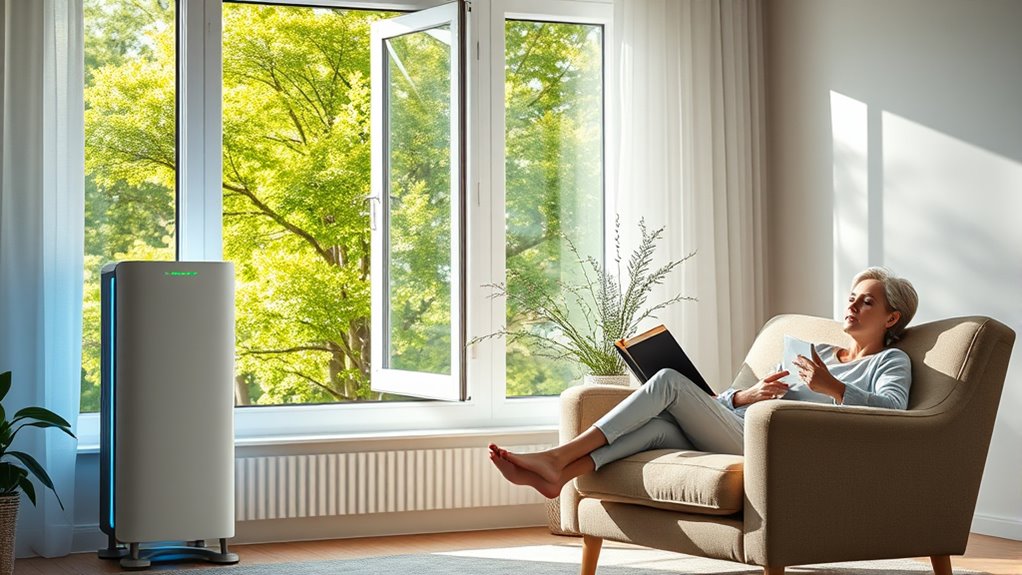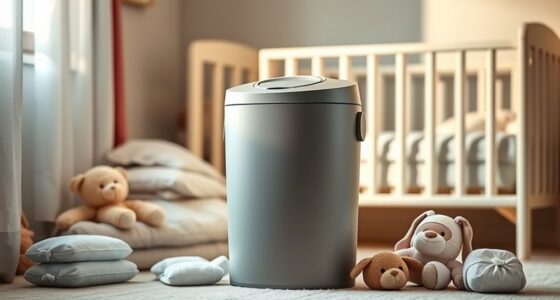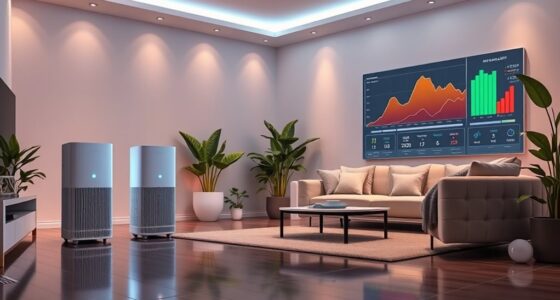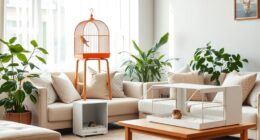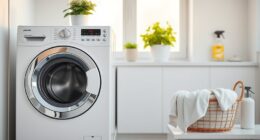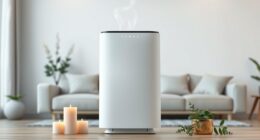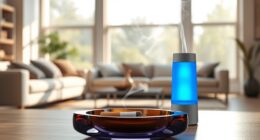If you’re looking for the best air filters for asthma in 2025, I recommend trying options like HEPA filters, portable nasal filters, and specialized device filters such as those for CPAP machines and nebulizers. These help reduce dust, pollen, pet dander, and other irritants that trigger asthma symptoms. Choosing the right filter depends on your environment and needs, so keep exploring to find the perfect fit for easier, cleaner breathing.
Key Takeaways
- A variety of air filters, including HEPA, nasal, and device-specific options, effectively reduce airborne allergens and pollutants for asthma relief.
- HEPA filters and true air purifiers capture 99.97% of particles ≥0.3 microns, improving indoor air quality for asthma sufferers.
- Reusable and replaceable filters for CPAP, nebulizers, and nasal devices offer cost-effective, long-term allergy management.
- Personal nasal and nose filters provide discreet, drug-free allergy symptom reduction, suitable for daily and travel use.
- Proper fit, regular maintenance, and device compatibility are essential to maximize filter effectiveness and comfort.
Boao Nebulizer Filters Replacement Air Filters (48 Pieces)
If you’re looking for reliable air filters to improve breathing comfort, the Boao Nebulizer Filters Replacement Air Filters (48 Pieces) are an excellent choice. These round filters, about 1.5 cm in diameter, are made from non-toxic, odorless materials suitable for daily use. Designed for compressor systems and cool mist devices, they effectively filter the air, making it fresher and cleaner. Regular replacement helps maintain device performance and extends its lifespan. With 48 filters included, you get enough for frequent use and sharing. Plus, they’re easy to swap out in just a few minutes, ensuring consistent, healthy airflow for you and your family.
Best For: individuals seeking reliable, easy-to-replace air filters to improve breathing quality and extend the lifespan of their nebulizer or cool mist devices.
Pros:
- Made from non-toxic, odorless materials suitable for daily use
- Compatible with most standard compressor systems and cool mist devices
- Includes 48 filters, providing ample replacements for long-term use and sharing
Cons:
- Size may vary slightly; verification required before purchasing
- Replacement process, though quick, still requires manual effort each time
- Not suitable for devices requiring specialized or proprietary filters
WoodyKnows Nasal Filters with Replacement Filters
WoodyKnows Nasal Filters with Replacement Filters stand out as an excellent choice for allergy sufferers seeking targeted relief from airborne irritants. These filters include 24 replacement units, designed to block dust, pollen, pet dander, and pollution. They fit comfortably with nostril-shaped frames and come in different sizes for a secure fit. Users find them effective at reducing allergy symptoms and often prefer them over masks or medication. Proper sizing and maintenance are key; trimming edges and checking for gaps improve comfort and performance. Overall, WoodyKnows nasal filters offer a reliable, reusable solution that can help you breathe easier, especially when exposure to airborne irritants is high.
Best For: allergy sufferers and individuals exposed to airborne irritants who need a comfortable, reusable nasal filter solution for targeted relief.
Pros:
- Effectively reduces allergy symptoms from dust, pollen, pet dander, and pollution
- Reusable filters with replacement options help save costs and extend usage
- Comfortable fit with various sizes and shapes, improving overall user experience
Cons:
- Proper fitting and sizing are crucial; incorrect fit may reduce effectiveness
- Some users experience discomfort from sharp edges or buckling, requiring trimming or adjustments
- Design changes in newer versions can cause gaps and reduce filtration performance
14 Pack Reusable CPAP Foam Filters
These 14-pack reusable CPAP foam filters are an excellent choice for anyone seeking a cost-effective, eco-friendly way to maintain clean airflow. Designed for Philips Respironics M Series, PR System One, and SleepEasy series, they measure approximately 1 3/4” by 1” by 3/8”. Made from durable, sterile sponge material, these filters won’t fade or degrade over time, ensuring safety and longevity. They’re lightweight and easy to handle, making replacement simple—just swap out the old filter through the device’s filter port. Customers praise their affordability and effectiveness, providing a practical, sustainable solution to keep your CPAP machine operating efficiently and your air clean.
Best For: individuals using Philips Respironics M Series, PR System One, or SleepEasy CPAP machines seeking an affordable, reusable filtration solution.
Pros:
- Cost-effective and reusable, reducing ongoing replacement expenses.
- Made from durable, sterile sponge material for safety and longevity.
- Easy to install and replace, ensuring quick maintenance and consistent airflow.
Cons:
- Slight sizing discrepancies may occur, affecting perfect fit for some devices.
- Reusable filters require regular cleaning and replacement to maintain effectiveness.
- Some users may prefer disposable filters for convenience or hygiene reasons.
12-pack CPAP Inline Filter, Universal Inline CPAP Filter
The pack of CPAP inline filters is an excellent choice for those seeking reliable air filtration compatible with most CPAP and BiPAP machines. I appreciate that these filters fit securely between the machine and tubing, ensuring proper airflow and easy installation. Made from durable materials like ABS plastic, cotton, and FSC-certified paper, they effectively trap debris and improve air quality. With a 12-pack, they offer great value, lasting 4-6 weeks each. Rated 4.6 stars, users find them compatible with heated hoses and effective without interfering with machine functions. Plus, they’re certified for safety, making them a dependable choice for cleaner, healthier sleep.
Best For: users seeking reliable, compatible, and cost-effective air filtration for their CPAP or BiPAP machines to ensure cleaner and healthier sleep.
Pros:
- Compatible with most CPAP and BiPAP models, including heated hoses and various series
- Easy to install and fit securely between the machine and tubing for proper airflow
- Reusable for 4-6 weeks, offering a cost-effective and environmentally friendly solution
Cons:
- Minor interference with some machine functions such as auto ON/OFF and pressure adjustments may require setting changes
- External testing certifications like IAPMO primarily ensure safety but do not guarantee universal compatibility
- The filters may need regular replacement to maintain optimal performance, which could be inconvenient for some users
TZ-K2 Filter Replacement for ToLife TZ-K2 Air Purifier (4 Pack)
If you’re looking for a reliable replacement filter that effectively improves indoor air quality for asthma sufferers, the TZ-K2 Filter Pack for the ToLife TZ-K2 Air Purifier is an excellent choice. This 4-pack includes true HEPA filters with a 3-in-1 system—pre-filter, HEPA, and activated carbon—that captures up to 99.97% of airborne particles, including dust, pollen, mold spores, pet dander, and PM 2.5. It also reduces odors from smoke, VOCs, and chemicals. Easy to install and compatible with the ToLife TZ-K2, these filters are recommended for replacing every six months, ensuring continuous, clean air in your home.
Best For: households with allergy sufferers, asthma patients, pets, or anyone seeking to improve indoor air quality with effective filtration.
Pros:
- Captures up to 99.97% of airborne particles with true HEPA filtration
- Includes a 3-in-1 system that reduces odors from smoke, VOCs, and chemicals
- Easy to install, fits perfectly with ToLife TZ-K2 air purifier, and is reasonably priced
Cons:
- Shorter lifespan compared to original filters, requiring more frequent replacements
- Filter replacement recommended every 6 months, which may be frequent for heavy users
- No batteries included or required, limiting functionality to filter replacement only
LEVOIT Air Purifiers for Bedroom with 3-in-1 Filter
For anyone seeking an effective and quiet air purifier for a bedroom, the Levoit Core Mini-P with its 3-in-1 filter system stands out as an excellent choice. It’s compact, lightweight, and easy to move, making it perfect for small to medium spaces like bedrooms. The genuine Levoit filters capture dust, pet dander, smoke, and airborne pollutants down to 0.1 microns, while the activated carbon neutralizes odors. Operating at just 27 to 45 decibels, it’s whisper-quiet, ideal for sleep. With simple controls, a fragrance sponge slot, and a 2-year warranty, it delivers reliable, efficient air purification without hassle.
Best For: individuals seeking a compact, quiet, and effective air purifier for small to medium bedrooms, offices, or personal spaces.
Pros:
- Compact, lightweight design makes it easy to move and fits well in small spaces
- Quiet operation at 27 to 45 decibels, ideal for sleeping and working without disturbance
- Effective 3-in-1 filtration captures pollutants, odors, and airborne particles down to 0.1 microns
Cons:
- Filter replacements must use genuine Levoit filters for optimal performance, which can be an additional cost
- Not suitable for very large spaces, as it effectively purifies up to approximately 337 square feet only
- Manufacturing is in Vietnam and China, which might be a consideration for some users concerned about sourcing
Nispira Disposable Replacement Filters for Omron Healthcare (12 Pack)
Nispira Disposable Replacement Filters for Omron Healthcare stand out as an excellent choice for allergy and asthma sufferers seeking reliable airborne contaminant removal. These filters are compatible with models like NE-C18, NE-C25, C30FL, and 9930, and come in a convenient 12-pack. Made from premium, non-toxic materials, they effectively trap dust, pollen, pet dander, and other invisible pollutants. Slightly larger than the original filters, they offer enhanced coverage for better filtration. Users praise their quality, noting reliable performance. Keep in mind, they’re not suitable for nebulizers, but overall, these filters provide an easy, effective way to improve indoor air quality.
Best For: allergy and asthma sufferers looking for reliable, enhanced filtration replacement filters compatible with Omron healthcare machines.
Pros:
- Effectively captures dust, pollen, pet dander, and other airborne pollutants
- Larger size provides enhanced coverage and filtration area
- Made from premium non-toxic materials with quality that meets or exceeds leading brands
Cons:
- Slightly larger than original filters, which may not fit all devices perfectly
- Not suitable for nebulizer machines
- Some users have reported size discrepancies compared to original filters
Air Purifiers for Home Large Room with HEPA Filter
A large room air purifier with a HEPA filter is an excellent choice for anyone seeking to improve indoor air quality, especially those with asthma. I recommend the KNKA True HEPA air purifier, which covers up to 2,325 sq. ft., making it perfect for living rooms, bedrooms, or offices. It features a triple filtration system, including a washable pre-filter and HEPA H13 filter that captures 99.9% of particles ≥0.3 microns, like dust, pollen, and odors. Its quiet sleep mode and auto-adjusting fan speed ensure effective purification without disturbance. Plus, its sleek design and user-friendly controls make it easy to incorporate into any large space.
Best For: those seeking an efficient, large-room air purifier for homes, offices, or bedrooms, especially for allergy and asthma relief.
Pros:
- Covers up to 2,325 sq. ft., suitable for large spaces with powerful purification.
- Advanced triple filtration including washable pre-filter and HEPA H13 filter that captures 99.9% of airborne particles.
- Quiet sleep mode and auto-adjusting fan ensure effective air purification without noise disturbance.
Cons:
- Filter replacements are needed every 3–6 months, which may add ongoing maintenance costs.
- Some users may find the initial setup or controls slightly complex for beginners.
- The unit’s size, while compact for its coverage, may still be noticeable in smaller or more cluttered rooms.
Nose Filters, Nasal Protection Device (6 Count)
If you’re seeking a discreet, drug-free way to reduce airborne irritants and improve breathing, the nose filters and nasal protection devices are an excellent choice. Made with electrostatically charged material, these filters block up to 99% of dust, pollen, pet dander, and industrial pollutants. They fit comfortably inside your nostrils and are perfect for daily use, travel, or sleeping in polluted environments. While they don’t fully block viruses like COVID-19, they help open nasal passages and reduce allergy symptoms. Easy to insert and replace, these filters offer a practical, on-the-go solution for cleaner, easier breathing.
Best For: individuals seeking a discreet, drug-free solution to reduce airborne irritants and improve breathing in polluted or allergen-rich environments.
Pros:
- Effectively blocks up to 99% of dust, pollen, pet dander, and industrial pollutants
- Easy to insert, comfortable, and discreet for daily, travel, or sleeping use
- Helps open nasal passages and reduces allergy symptoms without medications
Cons:
- May not fully prevent virus entry, especially for small pathogens like COVID-19
- Some users experience discomfort, nasal tenderness, or poor fit causing air leakage
- Filters may cause nasal soreness or may not stay securely in place for all users
MOOKA HEPA Filter Replacement for Air Purifiers
Are you searching for a reliable HEPA filter that effectively improves air quality for asthma sufferers? I’ve found that the MOOKA HEPA Filter Replacement is a great choice for compatible Allo and Fillo air purifiers. These filters are sealed to protect their lifespan and trap dust and dirt efficiently. They’re easy to install—simply remove the plastic packaging and fit them into your purifier. I recommend replacing them every six months for peak performance. Customers praise their fit, ease of use, and noticeable air quality improvements. Plus, resetting the filter lifespan is straightforward, ensuring your purifier operates effectively year-round.
Best For: allergy and asthma sufferers seeking reliable, easy-to-install HEPA filters to improve indoor air quality for compatible Allo and Fillo air purifiers.
Pros:
- Easy to install and replace, with simple removal of plastic packaging
- Effectively traps dust, dirt, and allergens, enhancing air quality
- Compatible with specific Allo and Fillo models and seals to protect lifespan
Cons:
- Not compatible with MOOKA M02 air purifier models
- Higher price point compared to generic filters
- Requires replacement approximately every 6 months for optimal performance
Funight KN95 Face Masks, 50 Pack, 5-Ply Disposable Masks
Looking for an affordable, reliable face mask that offers high filtration efficiency for daily use? The Funight KN95 Face Masks come in a 50-pack of 5-ply disposable masks, imported from China and designed for adults and teens. They meet GB2626-2019 standards, filtering at least 95% of airborne particles, similar to N95 masks. Made with multilayer non-woven melt-blown fabric, they provide excellent filtration and breathability. The masks are lightweight, comfortable, and fit snugly with adjustable nose clips and wider ear loops. Perfect for everyday activities, they offer solid protection, though some leakage may occur. They’re a great value for bulk purchasing.
Best For: individuals seeking an affordable, high-filtration disposable mask for daily activities, including adults and teens.
Pros:
- Meets GB2626-2019 standards with at least 95% filtration efficiency, comparable to N95 masks
- Lightweight, breathable, and designed for a comfortable fit with adjustable nose clips and wider ear loops
- Comes in a bulk pack of 50 masks, offering great value for frequent use
Cons:
- Some users experience minor fit issues or leakage around the nose bridge
- Variability in ear strap length may affect fit comfort for some users
- Not suitable for medical or high-risk environments and is intended for disposable, single-use only
Reusable Half Face Gas Mask with Safety Glasses and Filters
A reusable half-face gas mask with safety glasses and replaceable filters offers a reliable solution for anyone with asthma who needs extra protection during DIY projects, painting, or woodworking. Made from lightweight, comfortable TPE, it fits securely with adjustable straps, preventing leaks. The mask includes eye protection that resists fogging and fits well with the goggles. Equipped with filters for organic vapor, gases, and dust, it effectively blocks harmful particles and fumes. Regular filter replacement—cotton filters every 5 days and filter boxes after about 200 hours—ensures ideal performance. Many users find it durable, easy to clean, and essential for safer, more comfortable work environments.
Best For: DIY enthusiasts, professional workers, and anyone needing reliable respiratory and eye protection during painting, woodworking, or similar projects.
Pros:
- Comfortable, lightweight design with adjustable straps for a secure fit
- Effective filtration system for organic vapors, gases, and dust particles
- Includes safety goggles that resist fogging and provide eye protection
Cons:
- Slight fit challenges for very small or large face shapes
- Possible plastic odor upon unpacking that diminishes over time
- Minor discomfort on the nose bridge after extended wear
Veva HEPA Filter B Replacement for Germ Guardian Air Purifiers
The Veva HEPA Filter B Replacement is an excellent choice for asthma sufferers who want to maintain ideal indoor air quality with minimal hassle. It’s compatible with Germ Guardian models like AC4825, AC4900CA, AC4850PT, AC4820, and FLT4825, making installation straightforward with step-by-step instructions. The HEPA filter captures particles as small as 0.3 microns, including dust, pet dander, and pollen, while the activated carbon pre-filters help reduce odors from pets and cooking. Plus, with four pre-filters included, you get extended use and easier maintenance. Overall, this replacement set offers a cost-effective, efficient way to keep indoor air clean and healthier for allergy or asthma sufferers.
Best For: allergy and asthma sufferers seeking cost-effective, easy-to-install air purifier filter replacements that improve indoor air quality.
Pros:
- Compatible with multiple Germ Guardian models, ensuring versatile use
- Includes four pre-filters for extended maintenance intervals and better odor control
- Easy to install with clear, step-by-step instructions and a tight fit
Cons:
- May require gentle adjustments to fit perfectly in some units during initial installation
- Made of fiberglass, which may be a concern for those sensitive to materials
- Filters need regular replacement (HEPA every 2-3 months, carbon pre-filters monthly) to maintain optimal performance
Filters for CPAP Machine, 12 Pack Compatible with ResMed and Other Sizes
A 12-pack of compatible CPAP filters offers a cost-effective and convenient solution for maintaining clean air during sleep therapy. These filters fit most CPAP machines with 22mm tubing or 25mm mask elbows, making them versatile and easy to use. They effectively trap impurities and black debris from the air, ensuring you breathe purified air while protecting your device. Simply connect the filter between the air outlet and heated tubing; replacing them every four weeks helps maintain ideal performance. With this pack, you get reliable, clean airflow consistently, supporting your health and comfort during sleep.
Best For: Sleep apnea patients seeking an affordable, easy-to-maintain solution to ensure clean air and optimal device performance.
Pros:
- Compatible with most CPAP machines using 22mm tubing or 25mm mask elbows
- Effectively traps impurities and debris, ensuring purified airflow
- Comes in a 12-pack for convenient, long-term replacement
Cons:
- Recommends replacement approximately every 4 weeks, which may increase ongoing costs
- Disposable filters require regular maintenance and replacement
- Not suitable for CPAP machines with different tubing sizes or custom filters
15 Pcs Replacement Air Filter Sponge for Compressor, Universal Size
If you’re looking for reliable replacement filters for your compressor that can help improve air quality, these 15-piece sponge set offers an excellent solution. Each sponge measures about 19/32 inches in diameter and 7/20 inches high, made from soft, quality material. They fit most universal size compressors, making them versatile and easy to replace. Regularly swapping out these filters prevents contamination, ensuring your inhalation devices like nebulizers and compressors work efficiently. The set provides long-term supply, saving you money and hassle. Easy to install and maintain, these sponges help keep airflow clean and your equipment functioning perfectly, supporting healthier breathing.
Best For: users seeking affordable, reliable replacement filters for compressors and inhalation devices to ensure clean airflow and optimal machine performance.
Pros:
- Compatible with most universal size compressors, offering versatile use.
- Made from soft, quality material for effective filtration and durability.
- Cost-effective set providing long-term supply and easy maintenance.
Cons:
- Some users reported minor packaging opening issues during delivery.
- Filters may need frequent replacement for optimal performance.
- Not specifically designed for high-performance or specialized compressor models.
Factors to Consider When Choosing a Filter for Asthma Sufferers
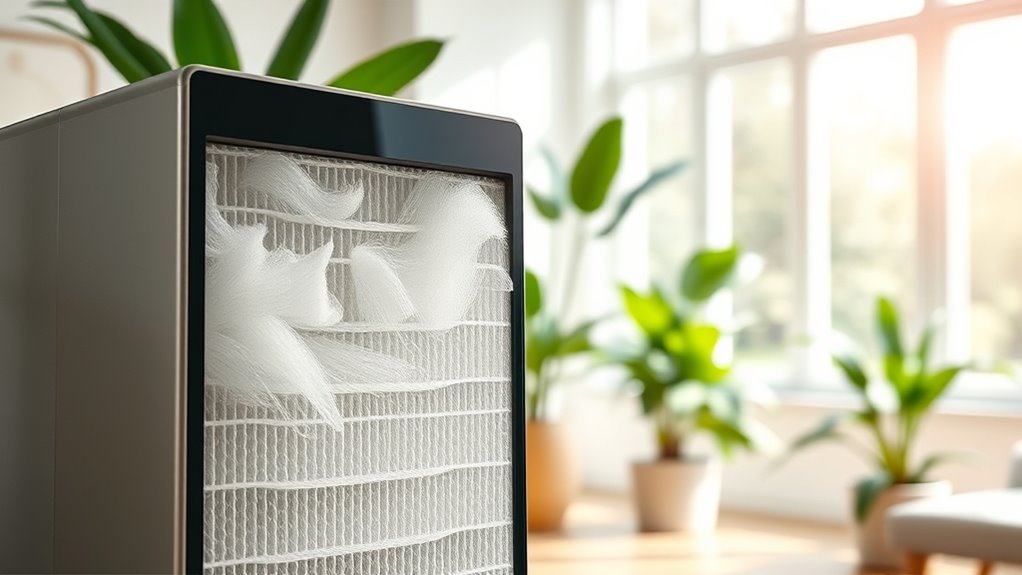
When choosing an air filter for asthma, I focus on the filtration technology and how effectively it eliminates particles. The quality of the filter material and how well it fits also matter for comfort and performance. Additionally, I consider how often I’ll need to replace the filter to guarantee consistent air quality.
Filtration Technology Type
Choosing the right air filtration technology is essential for asthma sufferers because it directly impacts the air quality you breathe every day. HEPA filters are the top choice, capturing at least 99.97% of particles as small as 0.3 microns, which include dust, pollen, and pet dander. Electrostatic filters use charged fibers to attract pollutants efficiently without restricting airflow, making them a good option for continuous use. Activated carbon filters excel at reducing odors and chemical vapors like VOCs, often triggers for asthma. UV-C light technology adds an extra layer by inactivating bacteria and viruses, offering added respiratory protection. Some advanced filters combine these technologies, providing extensive defense against a broad range of asthma triggers. Selecting the right technology depends on your specific sensitivities and environment.
Particle Removal Efficiency
Particle removal efficiency is a key factor to contemplate when selecting an air filter for asthma sufferers. It measures how well a filter captures airborne particles, including common triggers like dust, pollen, and pet dander. HEPA filters with at least 99.97% efficiency at 0.3 microns are ideal, as they effectively remove most asthma irritants. Filters rated with MERV 13 or higher also trap smaller particles, offering better protection. Performance is verified through standardized testing methods such as ASHRAE or EN 1822, ensuring consistency. Higher efficiency directly improves indoor air quality and can reduce asthma symptoms and respiratory irritation. When choosing a filter, prioritize particle removal efficiency to ensure you’re effectively filtering out the pollutants that can trigger asthma attacks.
Filter Material Quality
High-quality filter materials are indispensable for effectively removing airborne irritants that can trigger asthma symptoms. Materials like true HEPA or electrostatic non-woven fabrics can capture tiny particles as small as 0.3 microns, which is vital for reducing dust, pollen, pet dander, and mold spores. I look for filters made from non-toxic, odorless, and hypoallergenic materials to minimize the risk of allergic reactions or respiratory irritation. The durability and porosity of the material also matter; tightly woven fibers provide better filtration without restricting airflow. I prefer filters that meet strict standards like HEPA or MERV ratings, as they guarantee reliable allergen removal. Regularly replacing filters with high-quality materials keeps the air clean and maintains superior performance for healthier indoor air.
Fit and Comfort
Ensuring a good fit and comfort is essential when selecting filters for asthma sufferers, as even slight gaps can let unfiltered air slip through and diminish the filter’s effectiveness. A proper seal around the nose and nostrils prevents unfiltered air from bypassing the device, which is vital for managing symptoms. Comfort improves when filters match the user’s nasal size and shape, reducing irritation during prolonged use. Adjustable or nostril-shaped filters often provide a better fit, minimizing gaps that allow airborne irritants to enter. Ill-fitting filters can cause air leakage, lowering filtration efficiency and possibly triggering asthma symptoms. To maximize both comfort and effectiveness, choose filters with size and design options compatible with your nasal anatomy. A well-fitting filter makes a noticeable difference in your breathing experience.
Replacement Frequency
Choosing the right replacement schedule for your air filters is key to maintaining effective asthma management. I recommend replacing filters every 1 to 3 months to guarantee maximum removal of airborne irritants and allergens that can trigger symptoms. Using filters with a lifespan longer than six months may reduce filtration efficiency and increase exposure to triggers. It’s important to monitor your filter’s condition—if it looks dirty, clogged, or airflow decreases, it’s time for a change. In high-pollution environments, shorter replacement intervals are often necessary to prevent dust, pollen, and irritants from building up. Always follow the manufacturer’s guidelines for replacement frequency, as doing so helps maintain healthy indoor air quality and reduces the likelihood of asthma flare-ups.
Allergen Reduction Capabilities
Have you ever wondered how to pick an air filter that truly reduces allergens? The key is choosing one that captures tiny particles like pollen, dust mites, pet dander, and mold spores, which can trigger asthma symptoms. HEPA filters are excellent because they trap over 99.97% of airborne particles as small as 0.3 microns, making them highly effective for allergy sufferers. Activated carbon filters also play an essential role by reducing odors and chemical allergens, improving indoor air quality. Regularly replacing your filters is crucial to maintain their effectiveness and prevent trapped particles from degrading air quality. Proper allergen reduction can considerably lessen the frequency and severity of asthma attacks, helping you breathe easier and enjoy a healthier indoor environment.
Breathability and Airflow
When selecting an air filter for asthma, considering breathability and airflow is essential because filters that restrict airflow can make breathing more difficult and trigger symptoms. A filter with high breathability allows for easier inhalation and reduces discomfort during extended use. Proper airflow prevents pressure build-up, which can worsen asthma or cause difficulty breathing. Materials with electrostatic properties can boost airflow while effectively capturing airborne particles, striking a balance between filtration and breathability. Be cautious of overly dense or thick filters, as they may restrict airflow and increase breathing resistance. The design, pore size, and material composition are key factors; larger pores typically offer better airflow without sacrificing filtration efficiency. Prioritizing these elements helps ensure a filter that’s both effective and comfortable for daily use.
Compatibility With Devices
Ensuring your air filter is compatible with your device is a key step in maintaining effective asthma management. I always double-check the model numbers and size specifications to make sure the filter fits my air purifier, nebulizer, or CPAP machine perfectly. It’s important that the filter’s dimensions match the device’s slot or housing to prevent gaps that could let unfiltered air slip through. I also verify that the filter type—whether HEPA, activated carbon, or electrostatic—matches my asthma needs and is suitable for my device. I follow manufacturer guidelines closely to avoid using incompatible filters, which could damage my equipment or reduce filtration efficiency. While some filters claim universal compatibility, I still double-check size and fitting requirements for a proper fit and optimal performance.
Frequently Asked Questions
How Do I Determine the Right Filter Size for Asthma Relief?
To establish the right filter size for asthma relief, I always start by checking my HVAC system’s manual or the filter slot for the exact dimensions. I measure the existing filter if I’m replacing one, making sure to note the height, width, and thickness. Choosing the correct size guarantees proper filtration and airflow, which helps reduce asthma triggers. Don’t forget, a snug fit is key for ideal performance.
Are Certain Filter Materials More Effective for Allergy-Sensitive Asthma?
When it comes to filter materials for allergy-sensitive asthma, I’ve found that HEPA filters are the most effective. They trap tiny particles like pollen, pet dander, and dust mites that trigger asthma. Activated carbon filters are also beneficial because they absorb odors and chemical vapors. I recommend choosing a filter that combines HEPA with activated carbon for all-encompassing allergy relief, making breathing easier and reducing asthma flare-ups.
How Often Should Filters Be Replaced for Optimal Asthma Management?
Think of your air filter like a sponge – it gets dirty over time, losing its ability to trap allergens. I’ve learned that for ideal asthma management, I replace my filter every 1 to 3 months, depending on usage and air quality. Regular changes keep the air clean and my breathing easy. Trust me, sticking to this schedule makes a noticeable difference in my comfort and health.
Can Specialized Filters Reduce Airborne Irritants Better Than Standard Ones?
You’re wondering if specialized filters can better reduce airborne irritants than standard ones. From my experience, yes, they often do. HEPA filters, for example, are designed to trap tiny particles like pollen, pet dander, and dust mites, which are common asthma triggers. While standard filters help, investing in a high-quality, specialized filter can considerably improve indoor air quality, making breathing easier and reducing asthma symptoms more effectively.
Are There Filters Designed Specifically for Sensitive or Reactive Respiratory Conditions?
Think of filters for sensitive respiratory conditions as tailored suits—they fit just right to protect you best. Yes, there are filters specifically designed for people with asthma or allergies. These often feature high-efficiency HEPA filters or activated carbon layers that target irritants like pollen, pet dander, and smoke. Choosing the right filter can make breathing feel less like walking through a storm and more like a gentle breeze.
Conclusion
Did you know that indoor air pollution can be up to five times worse than outdoor air? That’s why choosing the right air filter is essential for asthma sufferers like us. Whether it’s HEPA filters or reusable options, finding the right fit can make a real difference in breathing easier. Don’t wait—invest in a quality filter today and take control of your indoor air quality for better, healthier days ahead.
